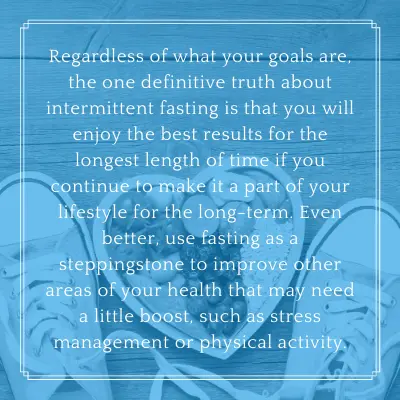The results of intermittent fasting (IF) will vary depending on the type of fasting you practice and how you live your life in the times when you’re not fasting, however, they’ve proven to be impressive, regardless of outside factors. IF is simply fasting on occasion, usually in some form of a routine, with a goal of achieving either improved weight or health results over time.
It’s most commonly used to refer to a daily fast of 12 – 16 hours, though this is more technically called time-restricted eating. In either case, this type of fasting does not require you to restrict what you eat but rather when you eat.
Benefits of Intermittent Fasting
There are many benefits of fasting in general that have been shown to improve health on many levels. Intermittent fasting specifically is relatively easy to work into your lifestyle and routine, helping you see results more reliably and consistently over time compared to most other types of fasting.
Most people find it difficult to stop eating for 24 hours or more, but it’s not so much of a stretch to restrain for only 12 hours. After all, we’re sleeping for 8 of those hours anyway. Once you’re well adapted to 12 hours, it becomes easier and easier to extend your fasting window and you may find yourself eating within an 8-hour window each day without even feeling hungry.
One of the greatest benefits of this type of fasting is that it helps you feel in control of your eating habits again. As your body adapts to a new feeding cycle, your metabolism and hormones will learn to serve your body more efficiently. If you previously had any dysfunction with your insulin levels or leptin – also known as your hunger hormone – intermittent fasting can have the happy result of rebalancing them to healthy levels again.
This will not only lower your risk of diabetes, but it also helps with natural appetite control. Even if fasting doesn’t require you to limit calories in order to see results, often you will naturally start to eat less in response to better hormone balance and fewer hours in the day in which your grazing or snacking. Since this is accomplished naturally, you will likely see weight loss that is permanent.
How Much Weight Can You Lose in a Month with Intermittent Fasting?
It’s nearly impossible to predict what kind of weight loss results you will see through intermittent fasting because every body is different and every person who fasts will do so with a unique routine.
Imagine a set of twins were exactly the same weight and they both decided to commit to a 16/8 fast for 1 month. One twin ate 2000 calories a day whereas the other ate 2600. One twin spent 1 hour each day walking to and from her office, whereas the other commuted by subway. Both of these people will likely lose weight just by the merits of intermittent fasting, but their overall results will be quite different.
Some research has shown intermittent fasting will reduce body weight on average by 3-8% over up to 24 weeks. In this study, the average weight loss was about 0.55 pounds per week, about 2.5 pounds per month. There are so many variables that aren’t addressed however, that it’s not necessarily predictive of what kind of success you personally can have.
If you reduce your calorie intake, you’re likely to lose more weight than if you eat the same amount of food, but in a shorter amount of time. Even in this example, however, you are still likely to start burning unwanted fat, so long as your fasting for at least 12 hours per day.
After 12 hours of having no new energy, your body will start to look for alternative sources, turning first to the stored fat it has been saving for just this purpose. The longer you fast, the more it will use this stored energy to keep your body running.
How to Get the Best Results
As a fasting coach, I’ve seen clients lose much more than this in a month and others not lose any weight but see their blood pressure measurements improve or reduce their demand on insulin instead.
Regardless of what your goals are, the one definitive truth about intermittent fasting is that you will enjoy the best results for the longest length of time if you continue to make it a part of your lifestyle for the long-term. Even better, use fasting as a steppingstone to improve other areas of your health that may need a little boost, such as stress management or physical activity.

Side Effects of Fasting
Any time you change your diet or exercise routine, you should make sure you’re making changes in a safe manner. Human biology relies heavily on routine, so sudden changes can come with significant risks.
The most obvious side effect that you’re likely to experience is hunger. If you’re used to grazing from the moment you wake up to the moment you fall asleep, you will feel hunger even on as little as a 12 hour fast. With patience and dedication, you’ll probably be surprised at how quickly you can adapt and how great it feels when you do.
Secondly, while most people feel more energized when they fast, which is a natural survival mechanism, some people do have a bit of an energy crash, leaving them feeling a bit tired or foggy until they get used to their new fasting protocol. This is most likely because what you choose to eat when you do eat is not adequately nourishing your body. Paying attention to the quality of the food you eat is always important, but especially so when you’re introducing a new pattern of restricted eating times.
Another symptom you may experience when you first start fasting is low blood sugar. Again, if your body is used to having a constant supply of energy, the hormones that are supposed to regulate this energy will have gotten lazy. It will take a few days or possibly weeks to work out the kinks but, over time, your blood sugar levels will be much better managed in the future when your hormones are back to doing their jobs properly. If you find you struggle with blood sugar crashes, start with a 10 hour fast and slowly work your way up to 12 hours or more.
How Many Calories Break a Fast
Technically, a single calorie will break your fast. If you’re fasting to improve your healthspan or lose weight, you can continue to see beneficial results even if you “cheat” a little, though there are some helpful tips to keep in mind.
If you are trying to extend your fasting from 12 to 14 hours, for example, you may find it helpful to drink some coffee or tea in the morning, which will help make you feel a bit full without actually taking in extra calories and breaking your fast. If you can’t drink coffee without some milk, a little high-fat dairy won’t negate the effects of your fast.
The positive results that come from fasting are mainly connected to our glucose levels. As long as you stay away from carbohydrates and limit your fat or protein intake to a few hundred calories in the morning, you will still reap the rewards of the extended fast. This is especially helpful as you’re progressing towards the 16+ hours of fasting each day.
Intermittent fasting is one of the easiest ways to train your body to work efficiently, with or without the constant influx of calories. It isn’t the only option, however, and you may be interested in reading our related post, Types of Fasting, next to get a better idea of what fast is right for you, right now.



